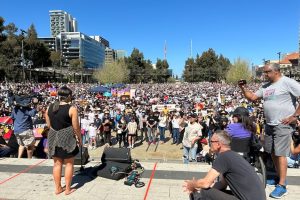 Written by Shona Reid, Guardian for Children and Young People
Written by Shona Reid, Guardian for Children and Young People
I am writing this week, in acknowledgment that many are hurting following the outcome of the Voice Referendum. Regardless of political views and how individuals voted, the past few months have been challenging, uncertain and stressful for many. The effects of community discussions, political debate and personal conflicts will ripple for some time.
I am particularly mindful of the impact of the Referendum on the children and young people who were not afforded the opportunity to vote, but who are most affected by the outcome.
In a recent statement, myself and my fellow Children’s Commissioners, Guardians and Advocates across the country called upon all Australians to engage in discussions about the Referendum with respect, empathy and a commitment to building a more inclusive and harmonious society for all – regardless of whether individuals planned to vote “yes” or “no”.
This sentiment remains equally important following the outcome of the Referendum. The way adults speak, write and act has the power to make children and young people feel safe and secure, or afraid and lonely. We know that they watch us and learn from what we say and do. If we want to teach and guide them to be respectful and listen to other voices, then we need to show them how.
I respect that people hold different views about the Voice Referendum, within both First Nations and non-First Nations communities throughout Australia. From both a personal and professional perspective, I would like to share that I am deeply saddened by the outcome of last weekend’s Referendum.
As the former CEO of Reconciliation SA, I have been privileged to see the power of providing space for First Nations people to share their experiences and knowledge. This process builds mutual understanding of histories and perspectives across different Australian communities, supports harmonious relationships and, most importantly, changes outcomes.
I have, and continue to, believe that those who are most affected by matters should be involved in decision-making, at all levels – from the day-to-day interactions in their local communities, up to the highest level of decision-making in Australia, our Federal Parliament.
In my first year as the Guardian for Children and Young People and Training Centre Visitor, my experience has been that First Nations children, young people and families continue to face systemic barriers to having their voices heard, and being truly engaged in decision making. I have observed systems that are built around viewing Aboriginality as a risk factor and do not recognise the inherent value and strengths of Aboriginal culture; good intentions undermined by inflexible systems that do not work for Aboriginal children and families; and, at times, the continued impacts of racial stereotypes, biases and prejudices. I strongly believe that the current state of play is a direct result of law and policy makers not listening to and engaging with the human experiences and expert advice of First Nations people. I will continue to advocate that improving the lives of First Nations children and families must be led by the voices and knowledge of First Nations people.
As we look to what comes next, I would also like to share that I am heartened about measures underway in South Australia, to improve the inclusion of First Nations voices in laws and policies. This includes the legislated South Australian First Nations Voice to Parliament; strong commitments to promoting First Nations voices in government strategies and action plans; funding for First Nations peak bodies and advisory commissions; and the Commissioner for Aboriginal Children and Young People’s inquiry into the application of the Aboriginal Child Placement Principle, with the preliminary report recommending extensive legislative reform to improve participation and partnership with Aboriginal children and families in child protection services.
Such measures are both a source of hope, and a call to action. Legislation, plans, funding and commitments to provide space for First Nations voices is a necessary step, but the burden for change must be shared between all of us. Meaningful change must be based on a genuine two-way relationship between First Nations and non-First Nations people in Australia, and the real test for both governments and our society is the capacity to listen and act when provided expert knowledge and insight (even if that advice differs markedly from what we are used to knowing).
As we take time for our communities to heal from the challenges of the last few months, let’s keep at the forefront of our minds that the driving force behind our efforts, campaigning and debates is the lives and wellbeing of children and young people. I believe this passion flows through the Uluru Statement from the Heart and all sides of politics. As adults, we must continue to work together, to find new and better ways to make our communities and systems a safe place for children to grow.
Finally, my message to children and young people in care and detention is this:
You have the right to freely express your views. What you think and feel is important.
You have the right to be free from bullying, harassment or being treated unfairly because you express your views, or because of your culture, race, or the colour of your skin.
I am committed to making South Australia a place where your views, voices and experiences are respected, valued and listened to.
